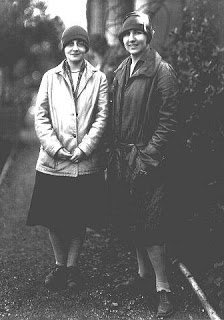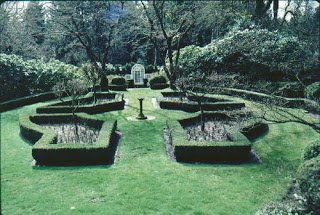A diminutive, but adult, young lady traveling to Europe by ship was placed by mistake at the Children’s Table in Dining Salon. When she requested a glass of wine and was refused, she insisted on being moved to another table. There she met Elizabeth Lord who would be her lifetime companion and partner in one of the pioneer landscaping firms of the Northwest. She was, of course, Edith Schryver.
Elizabeth Lord had an inspiration for following a career in gardening: her mother had founded the Salem Floral Society in 1915, now the Salem Garden Club, the first in the state. After her mother’s death in 1924, Elizabeth attended Lawthrope School of Landscape Architecture in Groton, Massachusetts and studied in Europe: a career in garden design being the object the two women who met aboard ship. After becoming friends and traveling and studying together for several months in England and on the continent, Edith returned to Salem with Elizabeth.
According to the Gaity Hill/ Bush’s Park Pasture Historical District descriptive brochure: “The 1929 founding of the firm of Lord and Schryver in Salem is considered one of the milestones in the history of Northwest garden design, as Lord and Schryver were the first women landscape architects in the Northwest. For the next four decades, the office designed and supervised work in Seattle, Tacoma, Portland, and Salem. Though the volume of work was comparatively small, the quality was consistently high. [They] brought to Oregon an intellectual Eastern command of craft and style, combined with an instructive sense of landscape taste otherwise unknown in Oregon during this period.”
Elizabeth’s first public service was as Chairman of the Willamette Valley Division of the State Federation of Garden Clubs. For Salem’s Garden Club she was responsible for the plantings around the Courthouse. In 1937 she was appointed to the Salem Parks Board and for nine years struggled with the problems of Englewood, Willson and Pringle Parks, and with an inadequate budget. She also served on the Salem Parks Advisory Committee and was Chairman of the Tree Committee. She fought for a tree planting program on the curbs of the residential areas, city responsibility for its upkeep, and the avenues of trees to provide vistas.
She served the state of Oregon on the Capitol Planning Commission from 1949 to 1963. She was especially involved with landscaping the Capitol Mall and the salvage of the old plantings in the Capitol Park after the Columbus Day storm in 1962. She also served on the Board and was president of the Salem Art Association when the Bush House furnishings were bought. From 1952 to 1968 she was responsible for landscaping the Minthorn House in Newberg, Herbert Hoover’s boyhood home.
She was quoted as believing that the “Salem people have never seemed to realize the great privilege we possess to make the city one of the outstandingly beautiful cities in our country.”
No one in Salem can fail to appreciate the blessings that have been bestowed on our residential communities and public parks by the dedication and talents of Elizabeth Lord and her partner, Edith Schryver. Although Elizabeth died in 1975 at the age of 88, and Edith in 1984, their presence is with us in their continuing gifts of natural beauty as the Deepwood garden photograph below.
We are indebted to Ruth Roberts for this story of Elizabeth and Edith’s meeting. Information about Elizabeth Lord’s achievements has been taken from an article in Panegyric II, a publication of Mission Museum, Inc. January 13, 1973.



